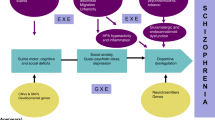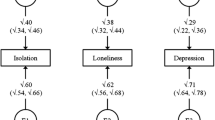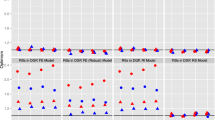Abstract
Almost 40 years ago, evidence from large studies of adult twins and their relatives suggested that between 30 and 60 % of the variance in social and political attitudes could be explained by genetic influences. However, these findings have not been widely accepted or incorporated into the dominant paradigms that explain the etiology of political ideology. This has been attributed in part to measurement and sample limitations, as well the relative absence of molecular genetic studies. Here we present results from original analyses of a combined sample of over 12,000 twins pairs, ascertained from nine different studies conducted in five democracies, sampled over the course of four decades. We provide evidence that genetic factors play a role in the formation of political ideology, regardless of how ideology is measured, the era, or the population sampled. The only exception is a question that explicitly uses the phrase “Left–Right”. We then present results from one of the first genome-wide association studies on political ideology using data from three samples: a 1990 Australian sample involving 6,894 individuals from 3,516 families; a 2008 Australian sample of 1,160 related individuals from 635 families and a 2010 Swedish sample involving 3,334 individuals from 2,607 families. No polymorphisms reached genome-wide significance in the meta-analysis. The combined evidence suggests that political ideology constitutes a fundamental aspect of one’s genetically informed psychological disposition, but as Fisher proposed long ago, genetic influences on complex traits will be composed of thousands of markers of very small effects and it will require extremely large samples to have enough power in order to identify specific polymorphisms related to complex social traits.


Similar content being viewed by others
References
Alford JR, Funk C, Hibbing JR (2005) Are political orientations genetically transmitted? Am Polit Sci Rev 99(02):153–167
Beckwith J, Morris CA (2008) Twin studies of political behavior: untenable assumptions? Perspectives Polit 6(04):785–791
Benjamin DJ, Cesarini D, van der Loos MJ, Dawes CT, Koellinger PD, Magnusson PK, Chabris CF, Conley D, Laibson D, Johannesson M, Visscher PM (2012) The genetic architecture of economic and political preferences. Proc Natl Acad Sci USA 109(21):8026–8031
Boardman JD (2011) Is gene-environment interplay relevant to the study of political behaviors and attitudes? In: Hatemi PK, McDermott R (eds) Man is by nature a political animal. University of Chicago Press, Chicago
Boardman JD, Blalock CL, Pampel FC, Hatemi PK, Heath AC, Eaves LJ (2011) Population composition, public policy, and the genetics of smoking. Demography 48(4):1517–1533
Boardman JD, Roettger ME, Domingue BW, McQueen MB, Haberstick BC, Harris KM (2012) Gene–environment interactions related to body mass: School policies and social context as environmental moderators. J Theor Polit 24(3):370–388
Bouchard TJ Jr, McGue M (2003) Genetic and environmental influences on human psychological differences. J Neurobiol 54(1):4–45
Bouchard TJ Jr, Lykken DT, McGue M, Segal NL, Tellegen A (1990) Sources of human psychological differences: the Minnesota Study of Twins Reared Apart. Science 250(4978):223–228
Charney E (2008a) Genes and ideologies. Perspectives Polit 6(02):299–319
Charney E (2008b) Politics, genetics, and “greedy reductionism”. Perspectives Polit 6(02):337–343
Charney E (2012) Behavior genetics and postgenomics. Behav Brain Sci 35:331–358
Charney E, English W (2012) Candidate genes and political behavior. Am Polit Sci Rev 106(01):1–34
Cranmer SJ, Dawes CT (2012) The heritability of foreign policy preferences. Twin Res Hum Genet 15(01):52–59
Dawes CT, Fowler JH (2009) Partisanship, voting, and the dopamine D2 receptor gene. J Polit 71(03):1157–1171
Duncan LE, Keller MC (2011) A critical review of the first 10 years of candidate gene-by-environment interaction research in psychiatry. Am J Psychiatry 168(10):1041–1049
Eaves LJ, Eysenck HJ (1974) Genetics and the development of social attitudes. Nature 249(454):288–289
Eaves LJ, Hatemi PK (2008) Transmission of attitudes toward abortion and gay rights: effects of genes, social learning and mate selection. Behav Genet 38(3):247–256
Eaves LJ, Hatemi PK (2011) Do we choose our spouse based on our in-laws? Resolving the effects of family background and spousal choice for educational attainment, religious practice, and political preference. Soc Sci Q 92(5):1253–1278
Eaves LJ, Eysenck HJ, Martin NG (1989) Genes, culture, and personality: an empirical approach. Academic Press, London
Eaves L, Martin N, Heath A (1990) Religious affiliation in twins and their parents: testing a model of cultural inheritance. Behav Genet 20(1):1–22
Eaves L, Martin N, Heath A, Schieken R, Meyer J, Silberg J, Neale M, Corey L (1997) Age changes in the causes of individual differences in conservatism. Behav Genet 27(2):121–124
Eaves L, Heath A, Martin N, Maes H, Neale M, Kendler K, Kirk K, Corey L (1999) Comparing the biological and cultural inheritance of personality and social attitudes in the Virginia 30,000 study of twins and their relatives. Twin Res 2(2):62–80
Eaves LJ, Hatemi PK, Prom-Womley EC, Murrelle L (2008) Social and genetic influences on adolescent religious attitudes and practices. Soc Forces 86(4):1621–1646
Eaves LJ, Hatemi PK, Heath AC, Martin NG (2011) Modeling biological and cultural inheritance. In: Hatemi PK, McDermott R (eds) Man is by nature a political animal evolution, biology, and politics. University of Chicago Press, Chicago, pp 101–184
Fazekas Z, Littvay L (forthcoming) The importance of context in the genetic transmission of us party identification. Political Psychology
Fowler JH, Dawes CT (2008) Two Genes Predict Voter Turnout. The Journal of Politics 70(03):579–594
Fowler JH, Dawes C (2013) In Defense of Genopolitics. Am Polit Sci Rev 107(02):362–374
Fowler JH, Schreiber D (2008) Biology, politics, and the emerging science of human nature. Science 322(5903):912–914
Fowler JH, Baker LA, Dawes C (2008) Genetic variation in political participation. Am Polit Sci Rev 102(02):233–248
Hatemi PK (2012) The Intersection of Behavioral Genetics and Political Science: Introduction to the Special Issue. Twin Research and Human Genetics 15(01):1-5
Hatemi PK (2013) The influence of major life events on economic attitudes in a world of gene- environment interplay. Am J Polit Sci 57(4):987–1000
Hatemi PK, McDermott R (2011a) Evolution as a theory for political behavior. In: Hatemi PK, McDermott R (eds) Man is by nature and nurture a political animal. University of Chicago Press, Chicago, pp 13–46
Hatemi PK, McDermott R (2011b) Man is by nature a political animal: evolution, biology, and politics. University of Chicago Press, Chicago
Hatemi PK, McDermott R (2012a) The genetics of politics: discovery, challenges, and progress. Trends Genet 28(10):525–533
Hatemi PK, McDermott R (2012b) A neurobiological approach to foreign policy analysis: identifying individual differences in political violence. Foreign Policy Anal 8(2):111–129
Hatemi PK, McDermott R (2012c) The political psychology of biology, genetics, and behavior. Polit Psychol 33(3):307–312
Hatemi PK, Medland SE, Morley KI, Heath AC, Martin NG (2007) The genetics of voting: an Australian twin study. Behav Genet 37(3):435–448
Hatemi PK, Funk CL, Medland SE, Maes HM, Silberg JL, Martin NG, Eaves LJ (2009a) Genetic and environmental transmission of political attitudes over a life time. J Polit 71(3):1141–1156
Hatemi PK, Medland SE, Eaves LJ (2009b) Do genes contribute to the “gender gap”? J Polit 71(01):262–276
Hatemi PK, Alford JR, Hibbing JR, Martin NG, Eaves LJ (2009c) Is there a “party” in your genes? Polit Res Q 62(3):584–600
Hatemi PK, Hibbing JR, Medland SE, Keller MC, Alford JR, Smith KB, Martin NG, Eaves LJ (2010) Not by twins alone: Using the extended family design to investigate genetic influence on political beliefs. Am J Polit Sci 54(3):798–814
Hatemi PK, Dawes CT, Frost-Keller A, Settle JE, Verhulst B (2011a) Integrating social science and genetics: news from the political front. Biodemography Soc Biol 57(1):67–87
Hatemi PK, Gillespie NA, Eaves LJ, Maher BS, Webb BT, Heath AC, Medland SE, Smyth DC, Beeby HN, Gordon SD, Montgomery GW, Zhu G, Byrne EM, Martin NG (2011b) A genome-wide analysis of liberal and conservative political attitudes. J Polit 73(1):271–285
Hatemi PK, Eaves L, McDermott R (2012a) It’s the end of ideology as we know it. J Theor Polit 24(3):345–369
Hatemi PK, Byrne E, McDermott R (2012b) Introduction: What is a ‘gene’ and why does it matter for political science? J Theor Polit 24(3):305–327
Howie BN, Donnelly P, Marchini J (2009) A flexible and accurate genotype imputation method for the next generation of genome-wide association studies. PLoS Genet 5(6):e1000529
Littvay L (2012) Do heritability estimates of political phenotypes suffer from an equal environment assumption violation? Evidence from an empirical study. Twin Res Hum Genet 15(1):6–14
Littvay L, Métneki J, Tárnoki ÁD, Tárnoki DL (2013) The Hungarian twin registry. Twin Res Hum Genet 16(Special Issue 01):185–189
Loehlin JC (1993) Nature, nurture, and conservatism in the Australian twin study. Behav Genet 23(3):287–290
Lykken DT, Bouchard TJ, McGue M, Tellegen A (1990) The Minnesota Twin Family Registry: some initial findings. Acta Geneticae Medicae et Gemellologiae 39(1):35–70
Martin NG, Eaves LJ, Heath AC, Jardine R, Feingold LM, Eysenck HJ (1986) Transmission of social attitudes. Proc Natl Acad Sci USA 83(12):4364–4368
McDermott R, Tingley D, Cowden J, Frazzetto G, Johnson DD (2009) Monoamine oxidase A gene (MAOA) predicts behavioral aggression following provocation. Proc Natl Acad Sci USA 106(7):2118–2123
Medland SE, Hatemi PK (2009) Political science, biometric theory, and twin studies: a methodological introduction. Polit Anal 17(2):191–214
Medland SE, Zayats T, Glaser B, Nyholt DR, Gordon SD, Wright MJ, Montgomery GW, Campbell MJ, Henders AK, Timpson NJ, Peltonen L, Wolke D, Ring SM, Deloukas P, Martin NG, Smith GD, Evans DM (2010) A variant in LIN28B is associated with 2D:4D finger-length ratio, a putative retrospective biomarker of prenatal testosterone exposure. Am J Hum Genet 86(4):519–525
Mondak JJ, Hibbing MV, Canache D, Seligson MA, Anderson MR (2010) Personality and civic engagement: an integrative framework for the study of trait effects on political behavior. Am Polit Sci Rev 104(01):85–110
Neale MC, Boker SM, Xie G, Maes HH (2003) Mx: statistical modeling, 6th edn. Department of Psychiatry, Richmond
Nicolae DL, Gamazon E, Zhang W, Duan S, Dolan ME, Cox NJ (2010) Trait-associated SNPs are more likely to Be eQTLs: annotation to enhance discovery from GWAS. PLoS Genet 6(4):e1000888
Orey BDA, Park H (2012) Nature, nurture, and ethnocentrism in the minnesota twin study. Twin Res Hum Genet 15(01):71–73
Posner S, Baker L, Heath A, Martin N (1996) Social contact, social attitudes, and twin similarity. Behav Genet 26(2):123–133
Price AL, Patterson NJ, Plenge RM, Weinblatt ME, Shadick NA, Reich D (2006) Principal components analysis corrects for stratification in genome-wide association studies. Nat Genet 38(8):904–909
Rietveld CA, Medland SE, Derringer J, Yang J, Esko T, Martin NW, Westra H-J, Shakhbazov K, Abdellaoui A, Agrawal A, Albrecht E, Alizadeh BZ, Amin N, Barnard J, Baumeister SE, Benke KS, Bielak LF, Boatman JA, Boyle PA, Davies G, de Leeuw C, Eklund N, Evans DS, Ferhmann R, Fischer K, Gieger C, Gjessing HK, Hägg S, Harris JR, Hayward C, Holzapfel C, Ibrahim-Verbaas CA, Ingelsson E, Jacobsson B, Joshi PK, Jugessur A, Kaakinen M, Kanoni S, Karjalainen J, Kolcic I, Kristiansson K, Kutalik Z, Lahti J, Lee SH, Lin P, Lind PA, Liu Y, Lohman K, Loitfelder M, McMahon G, Vidal PM, Meirelles O, Milani L, Myhre R, Nuotio M-L, Oldmeadow CJ, Petrovic KE, Peyrot WJ, Polašek O, Quaye L, Reinmaa E, Rice JP, Rizzi TS, Schmidt H, Schmidt R, Smith AV, Smith JA, Tanaka T, Terracciano A, van der Loos MJHM, Vitart V, Völzke H, Wellmann J, Yu L, Zhao W, Allik J, Attia JR, Bandinelli S, Bastardot F, Beauchamp J, Bennett DA, Berger K, Bierut LJ, Boomsma DI, Bültmann U, Campbell H, Chabris CF, Cherkas L, Chung MK, Cucca F, de Andrade M, De Jager PL, De Neve J-E, Deary IJ, Dedoussis GV, Deloukas P, Dimitriou M, Eiríksdóttir G, Elderson MF, Eriksson JG, Evans DM, Faul JD, Ferrucci L, Garcia ME, Grönberg H, Guðnason V, Hall P, Harris JM, Harris TB, Hastie ND, Heath AC, Hernandez DG, Hoffmann W, Hofman A, Holle R, Holliday EG, Hottenga J-J, Iacono WG, Illig T, Järvelin M-R, Kähönen M, Kaprio J, Kirkpatrick RM, Kowgier M, Latvala A, Launer LJ, Lawlor DA, Lehtimäki T, Li J, Lichtenstein P, Lichtner P, Liewald DC, Madden PA, Magnusson PKE, Mäkinen TE, Masala M, McGue M, Metspalu A, Mielck A, Miller MB, Montgomery GW, Mukherjee S, Nyholt DR, Oostra BA, Palmer LJ, Palotie A, Penninx BWJH, Perola M, Peyser PA, Preisig M, Räikkönen K, Raitakari OT, Realo A, Ring SM, Ripatti S, Rivadeneira F, Rudan I, Rustichini A, Salomaa V, Sarin A-P, Schlessinger D, Scott RJ, Snieder H, St Pourcain B, Starr JM, Sul JH, Surakka I, Svento R, Teumer A, Study TLC, Tiemeier H, van Rooij FJA, Van Wagoner DR, Vartiainen E, Viikari J, Vollenweider P, Vonk JM, Waeber G, Weir DR, Wichmann H-E, Widen E, Willemsen G, Wilson JF, Wright AF, Conley D, Davey-Smith G, Franke L, Groenen PJF, Hofman A, Johannesson M, Kardia SLR, Krueger RF, Laibson D, Martin NG, Meyer MN, Posthuma D, Thurik AR, Timpson NJ, Uitterlinden AG, van Duijn CM, Visscher PM, Benjamin DJ, Cesarini D, Koellinger PD (2013) GWAS of 126,559 individuals identifies genetic variants associated with educational attainment. Science 340(6139):1467–1471
Rose RJ, Kaprio J, Williams CJ, Viken R, Obremski K (1990) Social contact and sibling similarity: facts, issues, and red herrings. Behav Genet 20(6):763–778
Scarr S, McCartney K (1983) How people make their own environments: a theory of genotype → environment effects. Child Dev 54(2):424–435
Shultziner D (2013) Genes and politics: a new explanation and evaluation of twin study results and association studies in political science. Polit Anal 21:350–367
Skytthe A, Kyvik K, Bathum L, Holm N, Vaupel JW, Christensen K (2006) The Danish Twin Registry in the new millennium. Twin Res Hum Genet 9(6):763–771
Smith K, Hatemi P (2013) OLS is AOK for ACE: a regression-based approach to synthesizing political science and behavioral genetics models. Polit Behav 35(2):383–408
Smith KB, Oxley DR, Hibbing MV, Alford JR, Hibbing JR (2011) Linking genetics and political attitudes: reconceptualizing political ideology. Polit Psychol 32(3):369–397
Smith K, Alford JR, Hatemi PK, Eaves LJ, Funk C, Hibbing JR (2012) Biology, ideology, and epistemology: how do we know political attitudes are inherited and why should we care? Am J Polit Sci 56(1):17–33
Stam AC, Von Hagen-Jamar A, Worthington ABH (2012) Fear and attitudes towards torture and preventive war. Twin Res Hum Genet 15(01):60–70
Treier S, Hillygus DS (2009) The nature of political ideology in the contemporary electorate. Public Opin Q 73(4):679–703
Truett KR, Eaves LJ, Walters EE, Heath AC, Hewitt JK, Meyer JM, Silberg J, Neale MC, Martin NG, Kendler KS (1994) A model system for analysis of family resemblance in extended kinships of twins. Behav Genet 24(1):35–49
Verhulst B, Estabrook R (2012) Using genetic information to test causal relationships in cross-sectional data. J Theor Polit 24(3):328–344
Verhulst B, Hatemi PK (2011) The transmission of political attitudes and personality traits across generations. In: Annual meeting of the Midwestern Political Science Association, Chicago
Verhulst B, Hatemi PK (2013) Gene-environment interplay in twin models. Polit Anal 21:368–389
Verhulst B, Hatemi PK, Martin NG (2010) The nature of the relationship between personality traits and political attitudes. Personality Individ Differ 49(4):306–316
Verhulst B, Hatemi PK, Eaves LJ (2012a) Disentangling the importance of psychological predispositions and social constructions in the organization of american political ideology. Polit Psychol 33(3):375–393
Verhulst B, Eaves LJ, Hatemi PK (2012b) Correlation not causation: the relationship between personality traits and political ideologies. Am J Polit Sci 56(1):34–51
Wilson GD, Patterson JR (1968) A new measure of conservatism. Br J Soc Clin Psychol 7(4):264–269
Wright MJ, Martin NG (2004) Brisbane Adolescent Twin Study: Outline of study methods and research projects. Aust J Psychol 56(2):65–78
Acknowledgments
We thank the families for their participation. Funding was provided by the Australian National Health and Medical Research Council (241944, 339462, 389927, 389875, 389891, 389892, 389938, 442915, 442981, 496739,552485, 552498), the Australian Research Council (A7960034, A79906588, A79801419, DP0770096, DP0212016, DP0343921),the FP-5 GenomEUtwin Project (QLG2-CT-2002-01254), the U.S. National Institutes of Health (AA07535,AA10248, AA13320, AA13321, AA13326, AA14041, MH-20030 MH66206), the U.S. National Science Foundation (SES-1047687,09210080,729493,0721707, 0721378), the Jan Wallander and Tom Hedelius Foundation (P2008-0072:1), the Ragnar Söderberg Foundation (E9/11), the Swedish Council for Working Life and Social Research (2006-1623), the Swedish Research Council (2009-1713), and the Velux foundation, Denmark. Statistical analyses were carried out on the Genetic Cluster Computer, which is financially supported by the Netherlands Scientific Organization (NWO 480-05-003). S.E.M., is supported by the National Health and Medical Research Council Fellowship Scheme. B.V is supported by National Institute on Drug Abuse (5R25DA026119).
Author information
Authors and Affiliations
Corresponding author
Electronic supplementary material
Below is the link to the electronic supplementary material.
Rights and permissions
About this article
Cite this article
Hatemi, P.K., Medland, S.E., Klemmensen, R. et al. Genetic Influences on Political Ideologies: Twin Analyses of 19 Measures of Political Ideologies from Five Democracies and Genome-Wide Findings from Three Populations. Behav Genet 44, 282–294 (2014). https://doi.org/10.1007/s10519-014-9648-8
Received:
Accepted:
Published:
Issue Date:
DOI: https://doi.org/10.1007/s10519-014-9648-8




